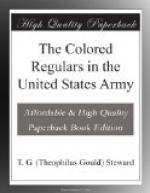Two of these volunteer regiments, the Eighth Illinois and the Twenty-third Kansas, reached Cuba and made history there, in garrison service, coming in direct contact with the Ninth Immunes, and in no sense suffering in comparison thereto. The Eighth Illinois being the first to go to the front, in a sense deserves to be noticed here first. This remarkable regiment was developed out of the Ninth Battalion, Illinois National Guard, and owes its origin to the persistent efforts of Messrs. John R. Marshall, Robert R. Jackson, Franklin Dennison, E.H. Wright, Rev. R.C. Ransom, Rev. J.W. Thomas, S.B. Turner and doubtless many others whose names do not appear. These gentlemen named called upon the Governor of their State the next day after the President had issued his call for 175,000 volunteers, and received from that official the assurance that if another call should be made they should have the opportunity to recruit their battalion to a regiment, and that he would “call that regiment first into the service,” and “that every officer in that regiment will be a colored man.”
After receiving this encouragement, the leaders began at once the work of organizing and recruiting, and when the second call came, May 25th, the regiment was well under way, and soon ready to go into camp to prepare for service. On June 30th it assembled in Springfield from the following places: Seven hundred men from Chicago; one hundred and twenty from Cairo; a full company from Quincy, and smaller numbers from Mound City, Metropolis and Litchfield, and nearly a company from Springfield. The regiment was sworn in during the latter half of July, the muster roll showing 1,195 men and 46 officers, every one of whom was of African descent except one private in a Chicago company.
Of these forty-six officers, ten had received college education, six were lawyers, and the others were educated in the public schools, or had served in the Regular Army as non-commissioned officers. Many of them were directly from Illinois, that is in the sense of having been born and reared in the State, and were fully accustomed to the full exercise of their rights as men and citizens. In character and intelligence the official element of the Eighth was about up to the standard of the volunteer army, as events subsequently proved.
Going into camp with the Ninth, white, this latter regiment, early in August, received an order to move to a Southern camp en route for Cuba, leaving the Eighth behind, greatly to the chagrin of both officers and men. Governor Tanner was evidently disturbed by this move, and expressed himself in the following language: “Even from the very doors of the White House have I received letters asking and advising me not to officer this regiment with colored men, but I promised to do so, and I have done it. I shall never rest until I see this regiment—my regiment—on the soil of Cuba, battling for the right and for its kinsmen.”




